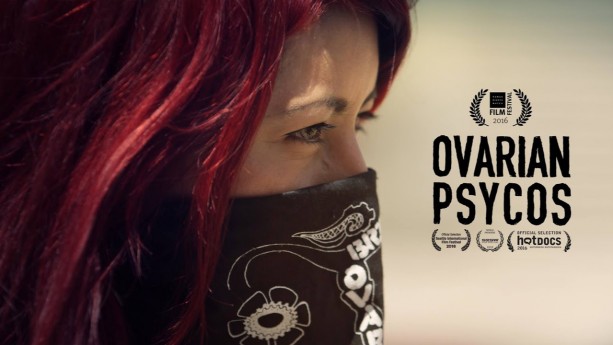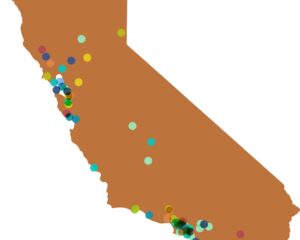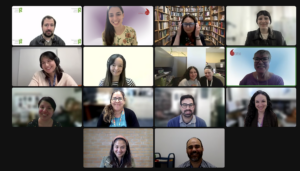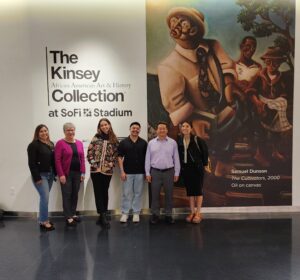Ovarian Psycos is a new documentary film from producer/directors Joanna Sokolowski and Kate Trumbull-LaValle about the irreverently named all-women bicycle brigade from Eastside Los Angeles. The film follows Xela de la X, Andi and Evie—three young women of color inspired by the historic legacy of the Chicano/a Civil Rights Movement and committed to confronting racism and creating safer streets for women in their community. Ovarian Psycos premiered at SXSW in 2016 and will be broadcast nationally on March 27 on the PBS series Independent Lens.
California Humanities recently spoke with grantees Joanna Sokolowski and Kate Trumbull-LaValle about their California Documentary Project-supported film.
Please tell us a little about yourself.
We are first time feature filmmakers. We met at the Social Documentation Masters program at University of California Santa Cruz, where we were trained by our mentors Renee Tajima Peña, B. Ruby Rich and S. Leo Chiang. Kate’s Latina with Mexican roots and grew up in San Diego, CA. After she graduated from NYU she started working in the field of youth media working as an educator and producer for Media Arts Center San Diego, San Diego Latino Film Festival and their Teen Producers Project and there she co-produced several short films in partnership with underserved young people ages 14-18 (many funded by California Humanities!). Joanna came to SocDoc after receiving her BA in Community Development, with an interest in films that get to the heart of the issue in a deeply personal way. We connected over our shared vision of crafting intimate, feminist, character-driven films and formed our production company Sylvia Frances Films to support our first feature.
Your California Documentary Project-funded film tells the story of the Ovarian Psycos Bicycle Brigade. Who are the Ovarian Psycos? Why was it important to record and share this story?
The Ovarian Psycos are an all women of color bicycle brigade from Eastside Los Angeles founded in 2010. They are fierce, unapologetic feminist women of color and brilliant strategists and have crafted an image and politics that centers their own voices—the stories of women of color from their neighborhoods—to fight against personal and collective violence. We hadn’t seen a film quite like this, one that profiled young women of color organizing, and believed their intersectional and radical approach to feminism and brilliant strategy to use bikes to deliver their message would make for a compelling, timely film.
In addition to Xela, Andi and Evie’s stories, what are the major themes and ideas that you hope audiences will take away from it? What does the film tell us about life in East Los Angeles? Or the United States in general?
In the film we cite a devastating global statistic from the World Health Organization that 1 in 3 women will experience physical or sexual violence. The threat is real for women, and disproportionately affects women of color. In the story we’ve tried to underscore what really seems to be at the heart of the Ovas organizing strategy—the idea that building sisterhood, or siblinghood, is a form of protection, it’s a safe haven to heal, and it’s back-up for the fight against inter-personal, institutional and historical violence.
We also attempted to craft an honest, intimate chronicle about the lives of young radical women who organize and that takes you from the streets where they ride in protest, to their bedrooms and kitchens where they reflect and live out their lives. The film delves into themes of racism, poverty, patriarchy, immigration, colonialism, and sexual violence, but the heart of the film is really the bonds of family and sisterhood.
What has been the response been so far from audiences? And for your film’s subjects?
It’s been an incredible ride. We unveiled the film together with Xela, Andi and Evie at the World Premiere at SXSW in Austin, TX last March. Since then, Xela and Andi have toured with the film quite a bit around the U.S., and have even organized their own screenings in New York, Chicago, and San Francisco. We also co-organized an Eastside L.A. community screening and fundraiser in collaboration with the current collective, and Ovas who appear in the film have travelled as far as the U.K., Germany, and Mexico. There are folks who seem to naturally connect to the work and stories of the Ovas for a myriad of reasons, but all who seem to be thrilled to see stories about young women, urban women, radical women, working class women, who are organizing together with purpose in meaningful and compelling ways. The Ovas are intentionally building their own safe spaces, in their own neighborhoods, within the context of violence—and that seems to resonate quite loudly for audiences. I think what the Ovas teach all of us is the importance of sisterhood—or siblinghood. Circle up, take up space, band together, invest and engage with your existing community, or actively take steps in building one.
What was your approach to making the film? What has been most challenging—and most rewarding—about doing this project?
This was our first feature film and we jumped right in—we put in our own money, borrowed time, asked friends and colleagues for favors reading grant applications, helping log footage, borrowed equipment. We also both became mothers during this project. Kate was pregnant during production, and had a baby during editing (who is now almost four). And Joanna was pregnant during post-production. We nursed and changed diapers during interviews, and in the editing room, and during color correction. So despite being “green” to the filmmaking process, one of the truly most unique challenges (and of course the joy) has been balancing being a first time feature documentary filmmaker and new motherhood. And now, standing on the other side of that process, looking back at the incredible relationships we have made both in front of and behind the camera, and being able to see the film come together as a resource for educational and community groups working in the themes of the film, it has been an incredible journey.
How can people see the film?
We are thrilled that the film will have its U.S. broadcast premiere on PBS’s Independent Lens on March 27th, it’s currently being screened in film festivals, community screenings, and universities across the United States, and we hope to make it available on iTunes in the near future. For screening updates and for more information about educational distribution, or to host a screening, please visit our website: http://www.ovarianpsycosdocumentary.com.
Lastly, why do the humanities matter?
The humanities matter because they help to ground our stories, to help us understand them in relationship to other stories, to help see what we have in common with one another, and what is distinct.





